Ayaz Memon
Sports journalist
I don't see why the law should be bent. Winning the World Cup was a splendid display of excellence. But that was also the main purpose of playing the tournament.
Over the six weeks that the tournament was played, I predicted in various forums that India will win the cricket World Cup. Am I worthy of an award (better still, reward) by some state government as were those who went onto the field and achieved this success?
I am being facetious, of course. Like every Indian, I rejoiced in the triumph of M S Dhoni and his merry band.
Should the Indian cricket team get a tax break?
Image: Kapil Dev holds the 1983 World Cup trophy.Photographs: Reuters.
Having lived off writing on cricket for more than 30 years, I understand the pressures, pains and travails that go into the making of an international player.
The game looks all too easy on a 20-inch screen, but it is far, far more difficult on the field. Add to this a billion armchair critics ready to give advice, to pillory a player for not succeeding, which adds enormously to the hardship quotient of an Indian cricketer.
Should the Indian cricket team get a tax break?
Image: Indian fans celebrate India's world cup victory.This is a trite argument that has no currency at least in the current environment in which a lot more non-cricket achievers like Saina Nehwal and Vijender Singh have also been amply rewarded.
I am not saying that non-cricketers earn as much as cricketers today; that comparison would be odious. But high performers from other disciplines are not struggling as much as their forerunners did because the socio-economic conditions in India have changed dramatically in the past two decades.
Should the Indian cricket team get a tax break?
Image: Indian team members celebrate after winning the World Cup.Winning the World Cup was obviously a splendid display of excellence. But that was also the main purpose of playing the tournament, and at an existential level, also the reason for a cricketer to be.
Several state governments in India have given the winning cricketers additional monetary awards, which must also be taxed.
Should the Indian cricket team get a tax break?
Image: MS Dhoni with the World Cup trophy.It is hard to imagine that any well-earning sportsperson would approve of such actions.
The governments in question would have been more in line if they had instituted scholarships for needy students in the name of the stars rather than use up much-needed funds.
Instead, in the euphoria over the victory, everyone tried to jump on the cash dole-out bandwagon, without much thought or consideration.
Should the Indian cricket team get a tax break?
Image: Boris Becker.Former tennis great Boris Becker, for instance, fought a long war with the German tax authorities about sharing his earnings.
Monaco is a popular tax haven for sportspersons to set up dual residence, as much as it is for celebrities from the world of entertainment, or business tycoons looking to avoid tax.
Ever since Bjorn Borg set up base in this Mediterranean principality, it has become a favourite among tennis stars.
Should the Indian cricket team get a tax break?
Image: Sachin Tendulkar after the World Cup victory.Photographs: Reuters.
Death and taxes, as Benjamin Franklin famously said, are the only two things certain in life.
This maxim applies as much to large corporations as it does to high net-worth individuals, and those much below that sort of earning bracket who nevertheless fall within the tax net. There's certainly no reason why cricketers should be exempt.
Of course, the Bharat Ratna for Sachin Tendulkar is something else altogether. It's a shame that sports does not feature in the criteria for this award. If there is some rule that needs to be amended, it is here, not in the tax policy.
Should the Indian cricket team get a tax break?
Image: A tax break is generally considered antisocial in certain societies.Aniruddha Deshpande
Promoter of Maharashtra Premier League
When a cricketer's career ends, not everybody gets an opportunity to become a commentator, umpire or coach. So there is a case to protect their income.
Benjamin Franklin said, "In this world nothing is certain but death and taxes." A tax break is, of course, discretionary.
The dictionary defines tax breaks as: "Tax break is a slang term referring to any item which reduces tax, including any tax exemption, tax deduction, or tax credit. Tax break is also a pejorative term used in the United States to refer to purportedly favourable tax treatment of any class of persons, as in 'individuals get a tax break for xxx'."A tax break is generally considered antisocial in certain societies, while it finds great support in others.
Should the Indian cricket team get a tax break?
Image: Sports enthusiasts feel tax breaks are necessary.A tax break is normally given on the criteria of profession, age, gender and merit. The tax break for the Indian cricket team falls in the third category: merit. Historically, such breaks have been frowned upon but times are changing.
The debate has surfaced after the World Cup rewards for the winning team from the The Board of Control for Cricket in India and others.
Sports enthusiasts like me believe that tax breaks are necessary to promote excellence in sports, like many other countries.
Also, promoting sports has a big influence on increasing tourism income, jobs and the overall well-being of society.
Should the Indian cricket team get a tax break?
Image: Sachin Tendulkar celebrates with team mates after dismissing Pakistan's Inzamam-ul-Haq.Photographs: Arko Datta/Reuters.
- Cricketers have a somewhat short career, sometimes one or two Test or one-day international matches in their whole lifetime.
Also, when a cricketer is most productive, the competition may be even severe. For example, when Padmakar Shivalkar was in form, the Prasanna-Bedi-Venkataraghavan trio was also at the peak and Shivalkar's career was very short, especially in the international arena.
Should the Indian cricket team get a tax break?
Image: Yuvraj Singh hugs captain Mahendra Singh Dhoni after they win the World Cup.Photographs: Reuters.
Should the Indian cricket team get a tax break?
Image: Yuvraj Singh hugs captain Mahendra Singh Dhoni after they win the World Cup.Photographs: Reuters.
- A tax break should be available only for outstanding achievements: A World or Asia Cup win, in all categories of play - Test, one-day international and T-20.
- Certain categories of income should be tax-fee after retirement.
Should the Indian cricket team get a tax break?
Image: Voluntary tax breaks can also be considered.As the table (slide 1) shows, almost everybody who was responsible for the World Cup win got something.
Self-imposed or voluntary tax breaks can also be considered. If the tax is 30 per cent, the player can pay only 15 per cent and the balance can go to a charitable institution of his choice.
Finally, tax breaks can be extended to other games with similar achievements. That will certainly dampen the present opposition to the tax break for the Indian team.

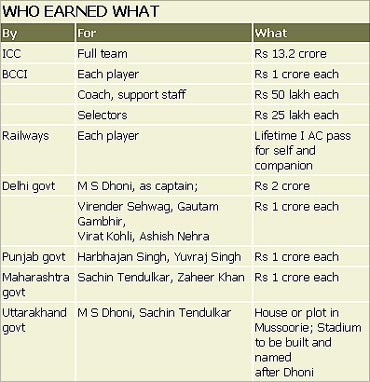


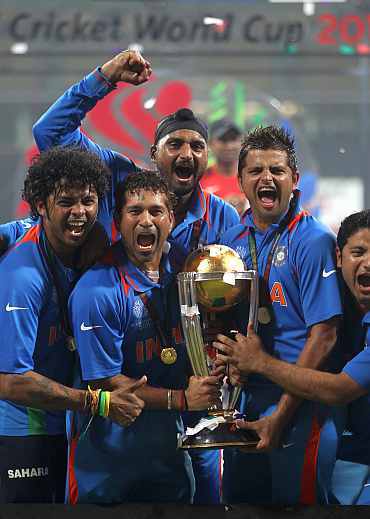
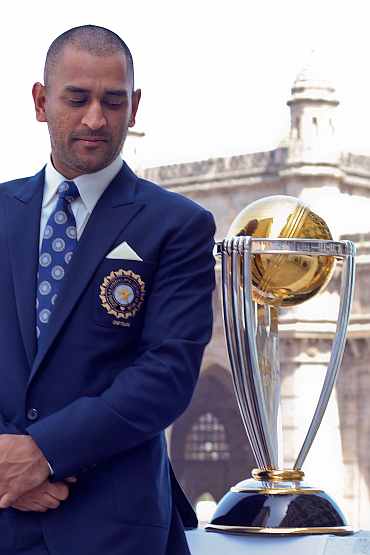

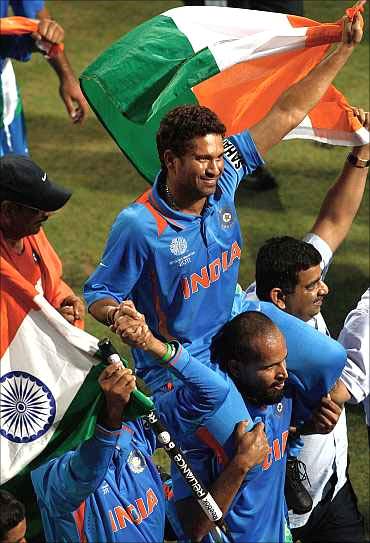


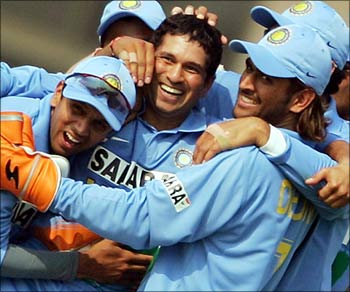
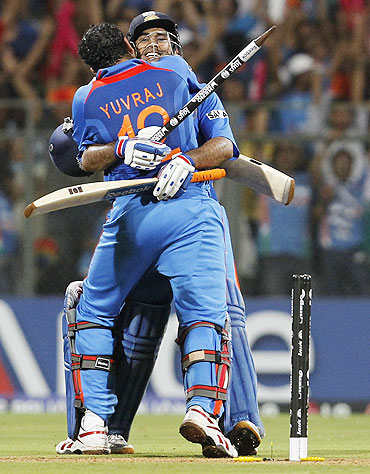

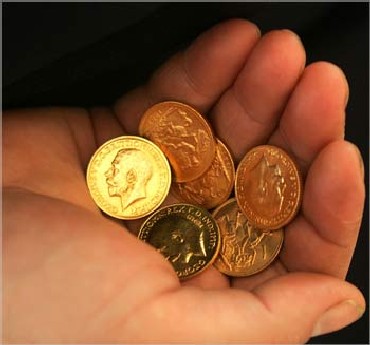

article